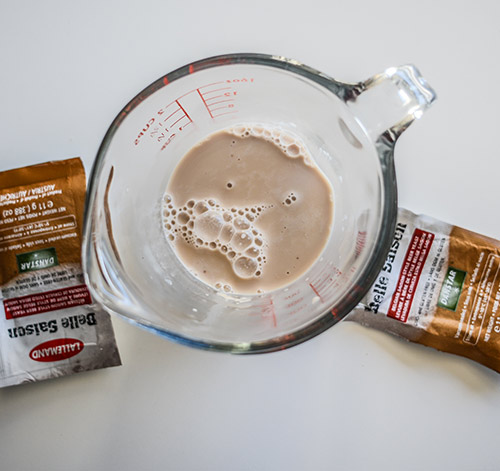
When using dry yeast, a recipe will often instruct for the packet to be pitched directly into the chilled wort. This action will most likely kick off fermentation, but it is not the most ideal way to introduce yeast to their new, sugary environment.
Directly pitching dry yeast is said to kill a large portion of the viable yeast cells, leaving those that remain stressed from the extra work they have ahead of them. Stressed yeast can create unwanted flavors and aromas during the fermentation process, so it is good practice to rehydrate dry yeast before pitching into the wort.
How to Rehydrate Dry Yeast
Rehydrating yeast can be done while chilling your wort and shouldn’t take more than 15 to 20 minutes. The idea is to combine water and dry yeast in order to “wake up” the yeast and restart its metabolism. When pitched directly into wort, the sugars that are present can prevent the yeast cells from drawing enough water through their cell membranes to kick start their metabolism.
Some packets of dry yeast will come with directions on how to rehydrate, and those should be followed. If a packet does not come with directions, follow these steps:

- Warm the dry yeast to room temperature
- In a sanitized container, prepare an amount of sterile water at 95-105°F (35-41°C) equal to 10 times the weight of yeast (10 ml/g of yeast)
- Optional: Add a rehydration nutrient like Go-Ferm, following the products instructions for appropriate amounts.
- Sprinkle the dry yeast on top of the water, trying to avoid setting up large, dry clumps. Let sit 15 minutes, then gently stir.
- When the yeast has reconstituted, gently stir again to form a cream and let sit another 5 minutes.
- Carefully and slowly, adjust the temperature of the yeast to within 15°F of the wort temperature.
- Pitch the resultant cream into the fermentation vessel, ideally as soon as possible.
No comments:
Post a Comment